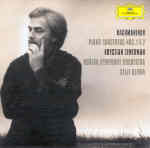Every new recording by Krystian Zimerman is something of an event, so it’s sobering to realize that these two performances, recorded in 1997 and 2000 respectively, are appearing only now. Artistically speaking Zimerman’s interpretive profile is so strong that like other keyboard giants–Sviatoslav Richter, for example–he’s bound to attract strong opinions pro and con, and in considering his performance of the Second Concerto it’s the great Russian pianist who comes most readily to mind. You find in both performances a similar deliberate thoughtfulness of pacing allied to great virtuosity that never precludes an element of spontaneous abandon. But there are also great differences, not the least of which is Zimerman’s highly interventionist approach to phrasing in slower tempos, which can (as in the case of his recent Chopin concertos) prove revelatory but may not impress some listeners as readily here.
Zimerman gives tremendous weight to the concerto’s introductory chords, and the entire opening paragraph passes by in a single breath. Indeed, the whole movement has impressive cogency, the buildup to the recapitulation is magnificently timed, the slower episodes are introspective but long of line and always full of interesting pianistic detail. The very slow adagio, though, risks turning static at a couple of moments despite gorgeous accompaniments from the Boston Symphony and Ozawa (they are magnificent throughout)–but the finale opens with an uninhibited abandon that alone justifies purchase of the disc. Ozawa and Zimerman find exactly the right tempo for this movement, allowing sufficient clarity for the soloist to phrase its principal theme with true “scherzando” playfulness, the contrast with the famous Big Tune being made as much through phrasing, legato, and textural density as through extremes of tempo.
In the First Concerto Zimerman’s approach is wholly winning. As he notes in the interview included in the accompanying booklet, this is “young man’s music”, and he plays with enthusiasm and freshness to the fore, even if the inevitable dose of mature wisdom necessarily creeps in now and again. Here there’s no tendency to worry the slow music–rather, Zimerman simply delivers a gracefully pointed Andante and a finale that manages to project an amazing amount of keyboard color while maintaining a lively basic tempo. Indeed, both here and in the finale of the Second Concerto it’s fascinating to hear just how much character Zimerman projects without the need to slow down and break the back of a phrase. So the single minor reservation concerning the Second Concerto’s adagio aside, and with well balanced sonics and plenty of weight given to the orchestra despite the jumbo-sized solo piano, this release earns an easy and enthusiastic recommendation.
































